Talkin’ italiano with Jovanotti

I’m intrigued by music that crosses borders, geographically and within perceived divisions of genres. As I’ve grown into a happily well-traveled, curious adult, I’ve (obviously) enjoyed expanding my ears beyond the pop hits, the oldies, and the cheesy synth hip-hop of my youth. One of the first global, non-American artists that started pushing some of those borders of my musical geography was the Italian artist Lorenzo Cherubini, known throughout Europe as Jovanotti.
I wrote about him late this past summer when I was preparing to go see his show on the Santa Monica Pier. I flew out to LA and back, spending less than 24 hours basking in this marvelously foreign glow, in order to take advantage of his handful of small-venue United States dates — a rarity for an artist who regularly sells out stadiums in Italy.
Pressed tight and sweaty with hundreds of dancing, singing Italians, lurching forward and back as one organism of enthusiasm, I remembered in their vibrancy what it is about Jovanotti that makes him so infectious. “Every Italian knows at least five Jovanotti songs by heart,” asserted one Italian-American reporter, and the crowd of stylish ex-pats that night certainly proved that point and beyond. I was thrilled by the enthusiasm, and –don’t forget– the dancing.
But you, dear reader, may wonder if it was only the faithful and the foreign who loved his show. No — there were plenty of uninitiated folks in the crowd on that Southern California pier that didn’t know anything more about Lorenzo, other than that respected indie-rock station KCRW was presenting the show, or maybe that, heck, it was an absolutely gorgeous summer evening by the waves. But by the end it seems safe to say that everyone was converted. I saw shining joy on people’s faces as they folded their blankets and put their shoes back on in the deepening summer twilight.
In San Francisco’s Stern Grove a few days later (a show attended by 10,000), the PBS reviewer wrote, “No one has more fun at a Jovanotti concert than Jovanotti himself.”
Jovanotti played a crucial part in my musical horizons opening, and evokes all those intangible boundary-pushing, dazzling moments of a semester spent abroad in a foreign country. He was one of the first artists I loved whose perspectives on the entire world was coming from a completely different place than all of mine.
Therefore, meeting and interviewing him before the Santa Monica show was, to me, akin to meeting Bono (a man Jovanotti calls friend, due to their joint efforts on the Cancel the Debt initiatives in developing countries). Beside the ferris wheel and crashing waves of the Santa Monica pier, he greeted me warmly, we sat down, and we chatted a bit about music, creativity, social justice, and the importance of rhythm.
It was a terrific night.
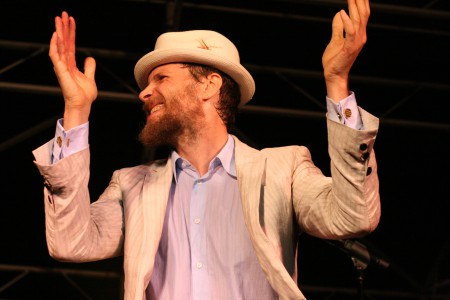
JOVANOTTI INTERVIEW
Fuel/Friends: The press has been writing about this tour and last summer’s tour as your attempt to “cross over” into American music. What do you think of that term, “crossing over”? Is it different when you play here versus Italy? What are your goals here?
Jovanotti: I don’t have any future goals. My only goal here is to have a good show, to make the people fun, to make the people feel good – this is the goal. I am not planning a career here, or trying to win the Grammy award, it’s not that. I’m having fun, I do so many big shows in Italy, you know? The chance for me to do some little shows here was stimulating. My job is to do music. It’s very exciting for me to do music in different places. The best thing is not always to do a stadium, but sometimes just one show in front of one hundred people.
F/F: How are you creatively inspired by the different places you perform?
J: I don’t know… I am more inspired by the different places that I travel. When I perform, it’s always an experience of giving, not of receiving. And so, I divide my life always into two phases – the phases of this out(ward) direction and in. When I do shows and I do tours, it’s the phase of ex-direction, so at the end of the tour I feel more vuoto, more empty than filled.
Then I have to stop and maybe, usually, I can go somewhere, wherever, alone. I go in South America, or Asia, it’s always something that attracts me a lot, to travel and lose myself in a town where no one knows me, and I don’t know nobody. It creates a condition in my mind that permits me to start approaching a new music form.
F/F: So, do you write better at home in Cortona or on the road when you are traveling?
J: Travel is like a way of training your observation. When you are in a place that you know well, you don’t see anything more. Ehm… when you go around the world, it is a way of practicing. My musical colleagues may all do this practicing in different ways, but we all must train our ability to observe, and our ability of creative synthesis. The synthesis is the final goal, to take a concept and synthesize it in one image. It is something that photographers do, it is something that you as a journalist do, with a phrase or an image or a word. Musicians may do it with a melody or a musical atmosphere, or with words.
For me, always the most difficult but stimulating part for me is the lyrical part of my songs. I always start from the lyrics. A song for me doesn’t exist until I have a word that gives me the key to enter the door. Then when I’m inside, I start, and sometimes it comes out in three minutes, sometimes it takes three years, sometimes it takes ten years. But at the end I am looking for the synthesis, when you can distill it down to the essence. I use different techniques. My favorite technique is that of the list. For me it is creatively very inspiring, I have books full of lists of everything. And then from that, it is a way to get an order. You know, creativity is a job. I don’t believe in pure inspiration. I believe in hard work.
F/F: Hmm, I can see your listmaking in your music — a lot of your songs will detail many seemingly simple things that add up to a complete and powerful image or effect.
J: Yes, that’s the way I like to write. I don’t have the talent to create a plot. I admire a lot my colleagues that write a song that is an intricate story. My talent is more impressionistic, less linear. I would like a lot to develop the narrative part to tell a story about somebody, in America, you know you have someone like Paul Simon or other folk songwriters. I love complex stories. It is something I am still not comfortable with what I am doing.
F/F: When you had that conversation with Bono for GQ magazine, you asked him about the moment of opportunity that lay ahead to bring the issue of Cancel the Debt to the forefront again, with the World Cup in Africa, and with Giovanna Melandri. Were your goals achieved with that?
J: No. No. But with Italian politics can be totally distant from our global vision of the world. We have a lot of problems with the politics. Italian politicians don’t have big horizons. The fact is that the African problem and poverty are not sexy from a media point. It is very hard to get the interest of the people. The politicians are only interested in the things that interest the people. The only great thing in Italy is that we have the church, so with the church you can attract the attention in these kinds of topics. So you have to pass through the church to get the attention of the politicians. So working in that way, we’ve made good gains towards Cancel the Debt, but after 9/11, everything started to be much harder in getting that message heard. With the soccer games, our political class didn’t catch the opportunity.
F/F: Are you still working towards African debt cancellation?
J: I am still working with it. But it is very difficult. When you are talking about poorness, people don’t want to know anything about that. It’s very hard when you are talking to push the button of compassion and charity inside people. Because with compassion and charity, we didn’t get many results.
But the next step –the “upgrade”— would be to go at it from a justice standpoint, it is a political justice issue. Poverty is not about a failure, or a lacking. It is a political issue, and Bono is also doing a good job at drawing attention to that. In Italy it is harder, because the church monopolizes the conversation, but uses it in a way that won’t talk about AIDS or other things that are totally central.
F/F: Last question, and then I’ll let you go because it sounds like they are getting ready for you out there. If the 20 year-old Jovanotti DJ could see what the 40 year-old you was doing right now, what do you think he would think?
J: (smiles) I think he would be happy. Maybe criticizing. When I was a DJ, I didn’t like musicians, I liked machines. I was doing hip hop, so for me the drum machine and the computer were all I needed. In the future I would be drawn back in to more machines. Rhythm for me is still the most attractive thing in music, especially when I was growing up. Rhythm has only expanded for me as I have learned more about different kinds of music. It has gotten to be the biggest thing — there’s nothing that I don’t like. But Rhythm and words have always been central. When I did my first commercial enterprise, I called it Soleluna, ritmo e parole – rhythm and words. That is what I will keep looking for, ehi?
****
Indeed. This video is exactly what my jaunt to Los Angeles was like, in seven pro-shot minutes:
Jovanotti is working on a new album (that’s what he is talking about in that video up there) which will continue to fuse Latin, African, European sounds and beyond. I do hope that he returns to the US, because he is a terrifically versatile, infectiously enthusiastic performer, and if you ever get a chance to see him, you must.
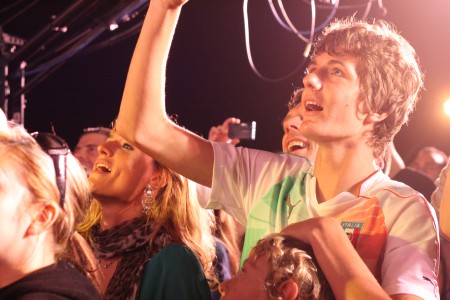
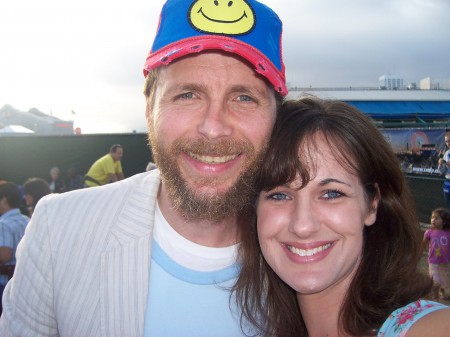
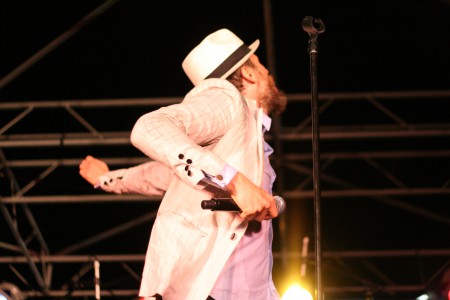
[top photo credit Mary Leipziger, who happened to be walking by. All my photos are on the Fuel/Friends Facebook page]



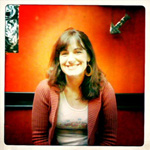 Name: Heather Browne
Name: Heather Browne
Fantastico, brava!
Lucia De Giovanni — October 13, 2010 @ 8:55 pm
Auguri Heather! Benvenutta alla “Jovanotti Fever” Baci!
Baci!
(Greetings! Welcome to “Jovanotti Fever”: D Kisses!)
Alicia Viteri — October 14, 2010 @ 11:08 am
good interview with one of my favorite italian singers.
ciao from Naples!!
alessio — October 16, 2010 @ 3:11 am
Heather compliments for the interview! Lorenzo is wonderfull and his music and energy are so involving!
evviva l’Italia!!
laura — October 16, 2010 @ 7:16 am
I attended his very intimate Montreal 2010 concert and it was awesome. Really enjoyed your interview as well. To many more…interviews and concerts!!! Bravo Jovanotti
Claudia — October 16, 2010 @ 8:20 am
interesting, thanks
eastlandgrl — October 18, 2010 @ 4:31 am
When is Jova coming to Colorado? I am a big fan and I want to see him playing here!
Mariano — November 4, 2010 @ 9:25 am
JOVANOTTi(O)=fermati qui` a Clevland (nell`Ohio)qualche volta! abbiamo bisogno della tua passione,musica ed un risveglio di “ITALIANITA”!…UN CALOROSO ABBRACCIO TIPICAMENTE ITALIANO!..(FRANCO E BASILIO)& THE SENSATIONAL ITALIAN SHOW REVUE “ORO PURO”
THE SENSATIONAL ITALIAN SHOW BAND "ORO PURO" — November 14, 2010 @ 7:57 pm
Potrebbe essere bene che cosa mettere nel mio piccolo weblog personale, se inserisco un riferimento alla presente pagina web?
DSLR-A850 — November 16, 2011 @ 11:13 am
Uno dei blog più impressionante che abbia mai visto. Grazie tanto per la tenuta del Internet di classe per un cambiamento. Youve ha stile, classe, spavalderia. Dico sul serio. Si prega di tenerlo perché senza Internet è sicuramente priva di intelligenza.
DSLR-A850 — November 16, 2011 @ 12:04 pm